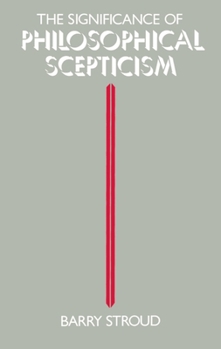The Significance of Philosophical Scepticism
Select Format
Select Condition 
Book Overview
This book raises questions about the nature of philosophy by examining the source and significance of one central philosophical problem: how can we know anything about the world around us? Stroud discusses and criticizes the views of such philosophers as Descartes, Kant, J.L. Austin, G.E. Moore, R. Carnap, W.V. Quine, and others.
Format:Paperback
Language:English
ISBN:0198247613
ISBN13:9780198247616
Release Date:August 1984
Publisher:OUP Oxford
Length:296 Pages
Weight:0.98 lbs.
Dimensions:0.7" x 5.5" x 8.5"
Customer Reviews
1 rating
What I imagine philosophy was once like...
Published by Thriftbooks.com User , 24 years ago
Most scholarly philsophy of the twentieth century has as yet failed to emerge from what Richard Rorty has termed the "linguistic turn." That is, by the early 1900's professional philosophers were driven out of the more investigative fictions through a few hundred years of forced exile qua scientific optimism and instead began to concentrate on the ability of the agent to actually say anything meaningful, a problem that many early modern philosophers, as evidenced by their lengthy treatises, did not appreciate. Stroud's work is a return to that older idea that philosophy should be less investigative and more speculative. 'The Significance of Philosophical Scepticism' seeks to reaqaint contemporary thinkers to an idea they had largely abandoned as meaningless or else secondary to the linguistic nature of experience. Stroud argues that, far from such belittling views, scepticism is alive and well. Indeed, the book could have been retitled 'The Damnable Persistance of Philsophical Scepticism' as Stroud shows how historical and now famous efforts to refute it, from Kant and Hume to Moore and Quine, have failed.He is not hopeless, however. In fact, one gets the distinct impression that Stroud is searching for a reply. "Even if the thesis means nothing, or not what it seems to mean, can the study of scepticism about the world around us nevertheless reveal something deep and important about human knowledge or human nature or the urge to understand them philosophically? I am pretty sure that the answer is 'Yes', but I do not get as far as I would like towards showing why that is so. Nor do I ever manage to state precisely what the lesson or moral of a study of philsophical scepticism might be" (Stroud, pg.ix). In that sense, the book reaffirms the faith that what philosophy is good at is not investigation, which in the intervening decades since Descartes we have delegated the exclusive realm of science, for good or ill, but instead of speculation. One has a hard time with the former if the latter remains unclear. The author says, "I mean that the study of the very nature of a philosophical problem can be an illuminating activity quite independently of whether it ever leads to a better answer" (Stroud, pg.x).Thus, in clear prose not muddled with the technical jargon of so much linguistic philsophy, Stroud returns an insightful if perhaps troubling view of the state of epistemology, and returns philosophy to its rightful role in modern thought. Well worth the 274 pages.





